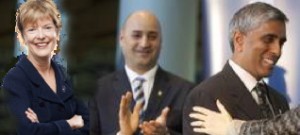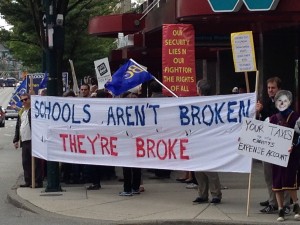On 27 October, UBC Insiders broke the story of the collusion between the UBC School of Kinesiology, Faculty of Education, and the School’s Undergraduate Society (KUS). In March 2015, the students held a referendum on a $250 fee to help pay for a new building for the School and Faculty. UBC Insiders obtained files through FoI that suggest about 16 months’ worth of influence of the School and Faculty on the students to secure a “YES” majority on the referendum.
UBC Insiders found top down influence (i.e., top of admin down) that adds up to minimally $41,624 and a curious “Make Your Mark” campaign.
Asking for an explanation of why a School or Faculty would go to these lengths to influence a student referendum, E. Wayne Ross called for a Fact-Finding investigation. Short of an investigation, Faculty administrators offered a consultation report this week (see full report below).
It’s probably just as well that there is just consultation with the School and students in lieu of a fact-finding investigation, as when the University contracts out to fact-finding, mysteriously, there are never any facts to find concerning administrators.
In this most recent report, it’s all just written off as administrative pluck, exuberance and “an excess of enthusiasm.”
Funny that, as we say the same of faculty, staff, students and their academic freedom: exuberance with surplus enthusiasm!
By way of a series of consultations, the Faculty of Education reports:
To provide a follow-up report on the Faculty Meeting item regarding, “the alleged conflicts of interest and potential ethical breaches in the School of Kinesiology’s April 2015 student referendum.”
We have consulted with various offices at the University, to determine at the most fundamental level, the evidentiary foundation that would warrant designing and arranging to be carried out, a “fact-finding” investigation. Such an investigation would be very expensive and would need a clear warrant in terms of evidence of basic problems of procedure, relationship management, finance, and/or policy.
The UBC offices we have consulted include:
- UBC Office of University Counsel
- UBC Faculty Relations
- UBC Office of the Vice President, Students
- School of Kinesiology
Regarding the School of Kinesiology there are a number of questions that have been raised concerning the “Make your Mark” Referendum of the Kinesiology Undergraduate Society (KUS) campaign (to add to KIN student fees to raise funds towards a new building) and distributed via media outlets.
On the basis of our investigation to-date, it appears that:
- Since the KUS took the Referendum off the AMS ratification agenda, the whole issue of the fees linked with the KUS Referendum is moot.
- Since neither the UBC nor the AMS/KUS policies regarding “conflict of interest” preclude Faculty/School and Student Society partnerships, there is no apparent ground for continued concern about the narrative of conflict of interest on the part of the School.
- The KUS may have erred in the design of “Make Your Mark” vis a vis the AMS policy of “impartial elections” but we – the University/School faculty members — do not work in a supervisory relationship to the student societies, which do not report to us nor are they governed by faculty/Schools.
With respect to “conflict of interest” – UBC’s policy on conflict of interest (Policy 97) is concerned with personal conflicts of interest – not institutional conflicts of interest. There has been no suggestion anywhere that the School of Kinesiology nor its executives benefitted from this matter personally (for example by benefitting financially).
There is no policy or rule that we are aware of that would preclude UBC units from partnering with student unions on initiatives they both support. There have been several examples of undergraduate student societies contributing to buildings (in return for guarantees of student amenities) through student fees and all of these initiatives involved very substantial interactions between the undergraduate student union, the AMS, the faculty and the UBC central administration. So the fact that the School was working closely with its KUS undergraduate society would not of itself be noteworthy.
Accordingly, we see no problem at-hand nor any substantive basis for carrying out any further fact-finding or other investigation.
There are, definitely, larger issues that lurk in this scenario worthy of a broad and open discussion that pertains to the current context of post-secondary education and the dramatic withdrawal of support from the Province and Federally — increasing fiscal pressures that have caused academic units to be more creative about issues of revenues, whether this is by seeking increases in international tuition or by creating fund raising partnerships with student organizations or with alumni to build infrastructure. These are complex matters. They are not, however, the basis for a narrative of blame or fault lodged with any particular academic unit. If there is any fault at all to be lodged with particular units it could only be, on the face of the evidence, of an excess of enthusiasm to support our engagement in the project of public education.
Dr. Blye Frank
Dean, Faculty of Education
Dr. Mary K. Bryson
Senior Associate Dean, Administration & Innovation, Faculty of Education

 Follow
Follow

Letter to @UBC President: time to lay down the mace #ubc100 #ubcnews #ubc #bced #highered #caut
Open Letter to UBC President Piper:
Time to Lay Down the Mace
It has been an emotional year for the University of British Columbia. As budgets moved from Central, the Truth and Reconciliation Commission of Canada launched Honouring the Truth, Reconciling for the Future. The residential university and college take on new meaning. As we launched the celebration of our Centennial at UBC 100, our President resigned under a cloak of secrecy. As we began to party, we launched an investigation to discover the lengths to which a Chair of the Board of Governors and administrators might go to suppress academic freedom. Now, as we march to Convocation, students and alumni launch evidence that UBC is failing to properly respond to sexual assaults on campus.
In the meantime, terrorists and terror struck Sharm el-Sheikh, Beirut and Paris while the dogs of war howl for bombers and drones to command from the skies above. Increasingly larger regions of the world live in a state of emergency.
It’s difficult to know where this University now stands or what it stands for.
To take a stand symbolic of peace and reconciliation, please lay down the mace for ceremonies and Convocation. Please put away the coat of arms and lay down the mace. If not for good, then how about for peace?
It is time to retire this symbol of aggression, authority and war. It’s time to march to graduation ceremonies this week with open and empty hands as symbolic of peace and reconciliation of controversies and roles of the President’s Office.
UBC’s mace is a relic but a relic of what? The mace is symbolic speech but what is it saying about us now?
From ancient times, this club, this weapon of assault and offence, the mace was gradually adorned until the late twelfth century when it doubled as a symbol of civil office. Queen Elizabeth I granted her royal mace to Oxford in 1589. From military and civil power derives academic authority. The rest is history and it is not all good.
Dr. Thomas Lemieux, School of Economics, with UBC’s Mace at the May 2015 Convocation.
It is time to retire the macebearer, whose importance is inflated every year by the image’s presence on UBC’s graduation pages leading to Convocation. In pragmatic terms, if the mace falls into the hands of the wrong macebearer or manager at this point, someone’s liable to get clocked with it.
Is UBC’s mace still a respectable appendage to Convocation?
Remember, since that fateful November day in 1997, just five months into your Presidency, when student activists put their bodies and minds on the line at the APEC protest, Tuum Est adorns both the can of mace sprayed in their eyes and the ceremonial mace that the President’s Office is eager to carry across campus every November and May. That’s “too messed,” as the students say.
Is it not time to retire both?
Comments Off on Letter to @UBC President: time to lay down the mace #ubc100 #ubcnews #ubc #bced #highered #caut
Posted in Academic freedom, Accountability, Administration, BC Education, Campus Life, Commentary, Critical University Studies, Faculty, Free speech, Governance, Government, Maces, Regalia, Scandals, Students
Tagged Academic freedom, Administration, Ethics, Faculty, Free speech, Governance, Government, Students, University presidents